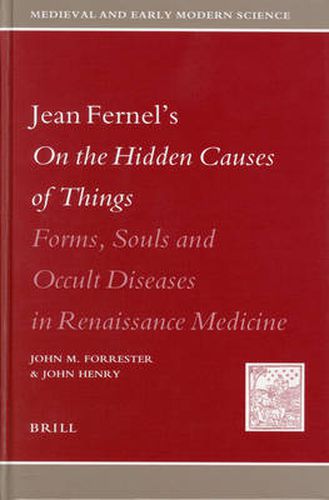Readings Newsletter
Become a Readings Member to make your shopping experience even easier.
Sign in or sign up for free!
You’re not far away from qualifying for FREE standard shipping within Australia
You’ve qualified for FREE standard shipping within Australia
The cart is loading…






An annotated translation of Jean Fernel’s On the Hidden Causes of Things (1542), with a scholarly introduction showing its great importance in the intellectual history of the Renaissance. The only sixteenth-century writer, apart from Paracelsus, to develop a new theory of disease, Fernel was also a leading natural philosopher. His survey of the role of occult qualities and powers in life processes, especially generation, and in contagious and pestilential diseases draws upon astrology, alchemy, and other occult sciences. Although an original and innovatory thinker, Fernel operated within the parameters of Aristotelian and Galenic philosophy, while drawing upon Platonic, Stoic and other worldviews. Accordingly, this book shows the continued vitality in traditional thought in the period just before the Scientific Revolution.
$9.00 standard shipping within Australia
FREE standard shipping within Australia for orders over $100.00
Express & International shipping calculated at checkout
An annotated translation of Jean Fernel’s On the Hidden Causes of Things (1542), with a scholarly introduction showing its great importance in the intellectual history of the Renaissance. The only sixteenth-century writer, apart from Paracelsus, to develop a new theory of disease, Fernel was also a leading natural philosopher. His survey of the role of occult qualities and powers in life processes, especially generation, and in contagious and pestilential diseases draws upon astrology, alchemy, and other occult sciences. Although an original and innovatory thinker, Fernel operated within the parameters of Aristotelian and Galenic philosophy, while drawing upon Platonic, Stoic and other worldviews. Accordingly, this book shows the continued vitality in traditional thought in the period just before the Scientific Revolution.